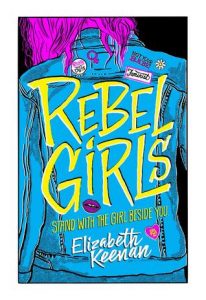 When it comes to being social, Athena Graves is far more comfortable creating a mix tape than she is talking to cute boys—or anyone, for that matter—and her staunchly feminist views and love of punk rock aren’t exactly mainstream at her conservative Catholic high school. Then a malicious rumor that her popular, pretty, pro-life sister had an abortion over the summer starts spreading through the halls. Despite their wildly contrasting views, Athena, Helen, and their friends must find a way to convince the student body and the administration that it doesn’t matter what Helen did or didn’t do… even if their riot grrrl protests result in the expulsion of their entire rebel girl gang.
When it comes to being social, Athena Graves is far more comfortable creating a mix tape than she is talking to cute boys—or anyone, for that matter—and her staunchly feminist views and love of punk rock aren’t exactly mainstream at her conservative Catholic high school. Then a malicious rumor that her popular, pretty, pro-life sister had an abortion over the summer starts spreading through the halls. Despite their wildly contrasting views, Athena, Helen, and their friends must find a way to convince the student body and the administration that it doesn’t matter what Helen did or didn’t do… even if their riot grrrl protests result in the expulsion of their entire rebel girl gang.
On its surface, Rebel Girls is a book about abortion, which shouldn’t have been a dirty word in 1992, the year the book takes place, or even now, in 2019, but it still kind of is and so here we are. 🤷♀️ I loved that Elizabeth Keenan decided to write a book focusing on abortion—as well as feminism, female friendships, slut-shaming, and bullying—because where were those books when I was a teenager? It took me until I was 26 until I remember even coming across the word feminism (thank you, Roxane Gay, as always), but then it was a black hole into which I willingly jumped. I couldn’t get enough—I still can’t, honestly—but what if I’d been exposed to riot grrrl at fifteen the way I’d been introduced to male-fronted punk and hardcore bands? What if I’d had a friend like Melissa? Or a relationship with my sister like that of Athena and Helen? (Which, admittedly, I did get, but it came much later.) Why didn’t The Perks of Being a Wallflower mention the words abortion or sexual assault or molestation? (Or, if it did, why don’t I remember?)
But I hate dwelling on what ifs—because I can’t do anything about them.
As soon as I saw the cover for Rebel Girls while walking the show floor at BookExpo America, I bee-lined for it, knowing that I needed to find out what kind of story would accompany such a kick-ass image. And once I did? I immediately added it to my TBR. But maybe I shouldn’t have; maybe I should have waited until other readers had a chance to read it first. Because, although this book was everything I would have wanted at Athena’s age, it wasn’t the kind of book I wanted now—and I’m not good at separating teenage me from thirty-something me, nor do I really want to be transported back to that time in my life.
So it’s hard to say that this book wasn’t good—because it was good, in a lot of important and fundamental ways—it’s more that this book wasn’t meant for me as I am at this moment. And trying to qualify the ways in which I disliked Rebel Girls negates how good it will be for other readers, at whatever ages they are, in whatever stage of feminism they find themselves. Because not everyone has found their voice yet—and books that articulate that struggle with nuance and care and love? Those books need to be written—because someone needs to read them. Although I don’t need to be reminded that being pro-choice simply means one acknowledges abortion as one choice out of many, some people do, and I can’t discount that.
Keenan writes in her author’s note that one of the main inspirations for Rebel Girls were the letters held in the Riot Grrrl Collection at the Fales Library & Special Collections at New York University, letters that “grappled with what it was like to be a teen girl, and to feel all the contradictions of knowing you have something to say, but being stuck in a culture that often disregards you.” I’ve been very fortunate to be on the other side of Athena’s struggle—to know that I have a voice, and that my voice is worth something, even if other people don’t think so. (Perhaps especially when other people don’t.)
So maybe I didn’t love Rebel Girls, but I really wasn’t meant to. Instead, I’m meant to pass it along to someone who does.


